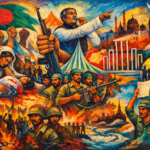The lexicons define the “deep state” as a sizable group of individuals, typically made up of members of government agencies and the military, who have long-term agendas and goals through covert manipulation or control of government policy through potentially unauthorized networks, which are challenging for the current administration to counter. Rogue elements among state organs may exist in a deep state.
A deep state’s objectives may include maintaining the state’s existence, job security, increased power and influence, and pursuing ideological or practical goals. Blocking, rejecting, and undermining their rules, regulations, and instructions can work against the objectives of elected authorities.
Since Pakistan’s inception as an independent nation-state, the deep state has existed. The deep state in Pakistan found a favourable climate that closely supported its creation and expansion due to several variables that predominated throughout Pakistan’s early years. The deep state in Pakistan, also known as the “Establishment,” must be addressed in an organized way based on honesty, sincerity, and a sense of true purpose if Pakistan is to progress into a responsible nation-state in the world of the “rules-based international order.”
Pakistan is a junction of South Asia, West Asia, and Central Asia and is away from resource-efficient to resource-deficient countries. Being the gateway to Central Asia and a suitable route of access for world powers into land-locked Afghanistan, Pakistan is the second country founded based on religion – the first being Israel, which was founded in the name of Judaism. For Pakistan, it was Islam.
As a middle power, Pakistan has the sixth-largest armed forces worldwide and is also a declared nuclear-weapon state, the second in South Asia and the only nation in the Muslim world to have that status. Pakistan is affected by internal instability and deep-rooted radicalization of society, reflected by the high levels of sectarian and terrorist violence. Their complicity in supporting the Taliban and Haqqani Network in Afghanistan has resulted in the spread of Islamist radicalization and terrorism not just in South Asia but much beyond.
Pakistan has witnessed nothing but turmoil in its political climate since its independence. The Pakistan army has constantly meddled in its national politics, wherein Frankensteins have been created to deliver justice with political biases. The same is highlighted by the fact that Pakistan’s political environment has only known upheaval since gaining independence. The Pakistani army has been meddling in its political system ever since Frankensteins were made to administer justice with political bias. The same point is made by the fact that Pakistan has a history of successful military takeovers, including those in 1953, 1958, 1977, and 1999, which are referred to as “constitutional coups” because at the time, Ghulam Mohammad, the governor-general, dismissed the government of Khawaja Nazimuddin, the then-prime minister, despite Nazimuddin having the support of the nation’s Constituent Assembly. This established a precedent that allowed the “Doctrine of Necessity” to be used to justify greater overt military involvement against legitimately elected governments. Policymakers have been held captive by the Pakistani army’s favours, as attested by the general chosen in advance.
Currently, the Pakistani army is in charge of the nuclear arsenal and the government. Any attempt by a civil administration in Pakistan to breach a line established by the deep state on any matter is derided as “rebellion.” The deep state of Pakistan, the army, maintains its power under the guise of national security and patriotism. The usual deep state would never permit a civilian administration to assert or deepen its position, even having direct authority.
It is consequently indisputable that Pakistan’s weak and unstable administrations, which it has always had since becoming a nation-state, have fit the deep state’s continuous control over its affairs. The precarious situation of political parties and their incapacity to provide effective leadership also backed the same. Additionally, the political parties were heavily complicit in acts of corruption, nepotism, and abuse of power, which undermined the country’s democracy.
The emergence of China, a significant power, as a neighbour of Pakistan is another major variable that has supported and continues to strengthen the deep state in that country. Beijing used the chance to further its long-term geopolitical goals, such as keeping India allied with it while it salami-sliced India’s holdings in the Himalayas, by prolonging Pakistan’s weakness and subservience.
The Pakistani army, which controls Inter-Services Intelligence, is now the most potent “deep state” in the world, and its decisions are final and binding.
Independence of East Pakistan in the 1971 Bangladesh Liberation War to the Indian military and India helped Mukti Bahini rebels, Pakistan is fixated on regaining control of the former state of J&K. However, Pakistan’s deep state is agitated since all of its previous initiatives have failed horribly.







I don’t think the title of your article matches the content lol. Just kidding, mainly because I had some doubts after reading the article.
Thank you for your sharing. I am worried that I lack creative ideas. It is your article that makes me full of hope. Thank you. But, I have a question, can you help me?
I don’t think the title of your article matches the content lol. Just kidding, mainly because I had some doubts after reading the article.
Your point of view caught my eye and was very interesting. Thanks. I have a question for you.
Thank you for your sharing. I am worried that I lack creative ideas. It is your article that makes me full of hope. Thank you. But, I have a question, can you help me?
Thank you for your sharing. I am worried that I lack creative ideas. It is your article that makes me full of hope. Thank you. But, I have a question, can you help me?
Thank you for your sharing. I am worried that I lack creative ideas. It is your article that makes me full of hope. Thank you. But, I have a question, can you help me? https://www.binance.info/sl/register?ref=OMM3XK51
Can you be more specific about the content of your article? After reading it, I still have some doubts. Hope you can help me.
Thanks for sharing. I read many of your blog posts, cool, your blog is very good.
I don’t think the title of your article matches the content lol. Just kidding, mainly because I had some doubts after reading the article.
Your point of view caught my eye and was very interesting. Thanks. I have a question for you. https://accounts.binance.info/ro/register?ref=HX1JLA6Z
I don’t think the title of your article matches the content lol. Just kidding, mainly because I had some doubts after reading the article. https://accounts.binance.com/fr/register?ref=T7KCZASX
Your point of view caught my eye and was very interesting. Thanks. I have a question for you.
Your point of view caught my eye and was very interesting. Thanks. I have a question for you. https://www.binance.com/ph/register?ref=IU36GZC4
Your article helped me a lot, is there any more related content? Thanks!
I don’t think the title of your article matches the content lol. Just kidding, mainly because I had some doubts after reading the article. https://accounts.binance.info/cs/register-person?ref=OMM3XK51
Your article helped me a lot, is there any more related content? Thanks!